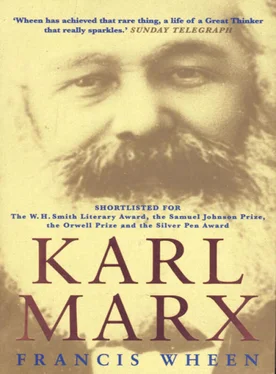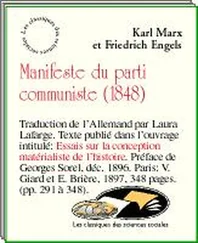The novice parents, though doting, were hopelessly incompetent, and by early June it was agreed that the two Jennys should spend several months with the Baroness von Westphalen in Trier learning the rudiments of motherhood. ‘ The poor little doll was quite miserableand ill after the journey,’ Jenny wrote to Karl on 21 June, ‘and turned out to be suffering not only from constipation but downright overfeeding. We had to call in the fat pig [Robert Schleicher, the family doctor], and his decision was that it was essential to have a wet-nurse since with artificial feeding she would not easily recover … It was not easy to save her life, but she is now almost out of danger.’ Better still, the wet-nurse agreed to come back to Paris with them. But in spite of Jenny’s happiness (‘my whole being expresses satisfaction and affluence ’), she couldn’t entirely dispel her old forebodings. ‘Dearest heart, I am greatly worried about our future … If you can, do set my mind at rest about this. There is too much talk on all sides about a steady income.’ A steady income was one necessity of life that always eluded Karl Marx.
His job in Paris, which seemed to promise financial security, turned out to be even more temporary than his last editorship. Only one issue of the Deutsche-Französische Jahrbücher appeared before the breach with Ruge became irreparable – and it scarcely lived up to the cross-border promise of its title. Though France was well supplied with writers, not one of them was willing to contribute. To fill the gap, Marx included his essays on the Jewish question and on Hegel, together with an edited version of his correspondence with Ruge over the previous year or two. The only non-German voice was that of an exiled Russian anarcho-communist, Michael Bakunin. ‘ Marx was then much more advanced than I was,’ he recalled. ‘He, although younger than I, was already an atheist, an instructed materialist, and a conscious socialist … I eagerly sought his conversation, which was always instructive and witty, when it was not inspired by petty hate, which alas! was only too often the case. There was, however, never any frank intimacy between us – our temperaments did not permit. He called me a sentimental idealist, and he was right; I called him vain, perfidious and sly, and I was right too.’
For all its obvious deficiencies, the first and last issue of the Jahrbücher did have one contributor of international stature – the romantic poet Heinrich Heine, whom Marx had revered since childhood and befriended soon after arriving in Paris. Heine was a painfully thin-skinned creature who often burst into tears at the slightest criticism; Marx was a pitiless critic of magnificent insensitivity. For once, however, he restrained his icon-smashing inclinations, in deference to a genuine hero of literature. Heine became a regular visitor to the Marxes’ apartment in the Rue Vanneau, reading aloud from works in progress and asking the young editor to suggest emendations. On one occasion he arrived to find Karl and Jenny frantic with worry over little Jennychen, who had an attack of the cramps and was – or so they believed – at death’s door. Heine took charge at once, announcing that ‘the child must have a bath’. And so, according to Marx family legend, the girl’s life was saved.
Heine was not a communist, at least in the Marxian sense. He cited the tale of a Babylonian king who thought himself God but fell miserably from the height of his conceit to crawl like an animal on the ground and eat grass: ‘This story is found in the great and splendid Book of Daniel. I recommend it for the edification of my good friend Ruge, and also to my much more stubborn friend Marx, and also to Messrs Feuerbach, Daumer, Bruno Bauer, Hengstenberg, and the rest of the crowd of godless self-appointed gods.’ He contemplated the victory of the proletariat with dread, fearing that art and beauty would have no place in this new world. ‘The more or less clandestine leaders of the German communists are great logicians, the most powerful among them having come from the Hegelian school,’ he wrote in 1854, referring to Marx. ‘These doctors of revolution and their relentlessly determined pupils are the only men in Germany with some life in them and the future belongs to them, I fear.’ Shortly before his death in 1856 he wrote a last will and testament begging forgiveness from God if he had ever written anything ‘immoral’, but Marx was prepared to overlook this lapse into piety – which in anyone else would have provoked his most savage scorn. As Eleanor Marx wrote, ‘ He loved the poet as much as his worksand looked as generously as possible on his political weaknesses. Poets, he explained, were queer fish and they must be allowed to go their own ways. They should not be assessed by the measure of ordinary or even extraordinary men.’
The Jahrbücher may have been a financial disaster but it enjoyed great succès d’estime , not least because of Heinrich Heine’s satirical odes on King Ludwig of Bavaria. Hundreds of copies sent to Germany were confiscated by the police, who had been warned by the Prussian government that its contents were an incitement to high treason. An order went out that Marx, Ruge and Heine should be arrested at once if they attempted to return to their fatherland. In Austria, Metternich promised ‘severe penalties’ against any bookseller caught stocking this ‘loathsome and disgusting’ document.
Arnold Ruge, taking fright, left Marx in the lurch by suspending publication and refusing to pay him the promised salary. Some historians have claimed that the quarrel needn’t have become terminal ‘ had not other personal differences, especially on fundamental matters of principle, been developing between them for some time’. But in fact the most ‘fundamental matter of principle’ was a ridiculous squabble over the sex life of their colleague Georg Herwegh, who had already betrayed his new bride by starting an affair with the Comtesse Marie d’Agoult, a former mistress of the composer Liszt and mother of the girl who became Cosima Wagner. ‘ I was incensed by Herwegh’s way of livingand his laziness,’ Ruge wrote to his mother. ‘Several times I referred to him warmly as a scoundrel, and declared that when a man gets married he ought to know what he is doing. Marx said nothing and took his departure in a perfectly friendly manner. Next morning he wrote to me that Herwegh was a genius with a great future. My calling him a scoundrel filled him with indignation, and my ideas on marriage were philistine and inhuman. Since then we have not seen each other again.’
Although Marx often railed against promiscuity and libertinism with the puritanical ferocity of a Savonarola – if only to disprove the charge that communism was synonymous with communal sex – he observed the amorous escapades of his friends with amusement and, perhaps, a touch of envy. Jenny certainly feared as much. ‘ Although the spirit is willing, the flesh is weak,’ she wrote from Trier in August 1844, two months after leaving her husband alone in Paris. ‘The real menace of unfaithfulness, the seductions and attractions of a capital city – all those are powers and forces whose effect on me is more powerful than anything else.’ She needn’t have worried. Among the seductions and attractions of Paris, the rustle of a countess’s skirt could not begin to compete with the clamour of politics. In the summer of 1844 Marx took up an offer to write for Vorwärts !, a biweekly communist journal sponsored by the composer Meyerbeer and now edited by Karl Ludwig Bernays, who had collaborated on the Deutsche-Französische Jahrbücher .
As the only uncensored radical paper in the German language appearing anywhere in Europe, Vorwärts! , provided a refuge for all the old gang of émigré poets and polemicists, including Heine, Herwegh, Bakunin and Arnold Ruge. Once a week they would gather at the first-floor office on the corner of the Rue des Moulins and the Rue Neuve des Petits for an editorial conference presided over by Bernays and his publisher, Heinrich Börnstein, who recalled:
Читать дальше












